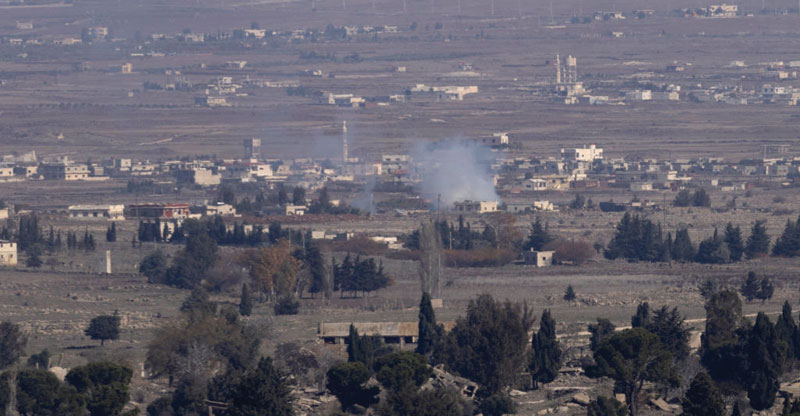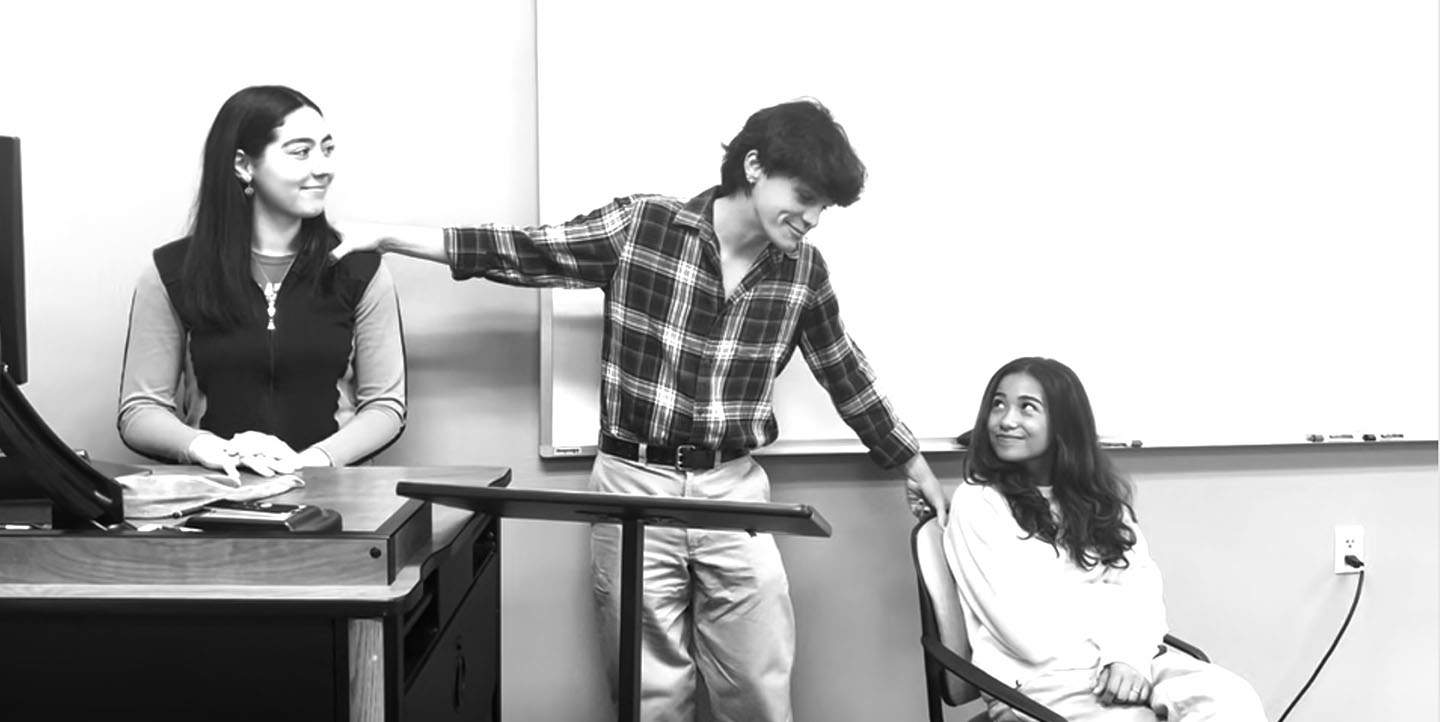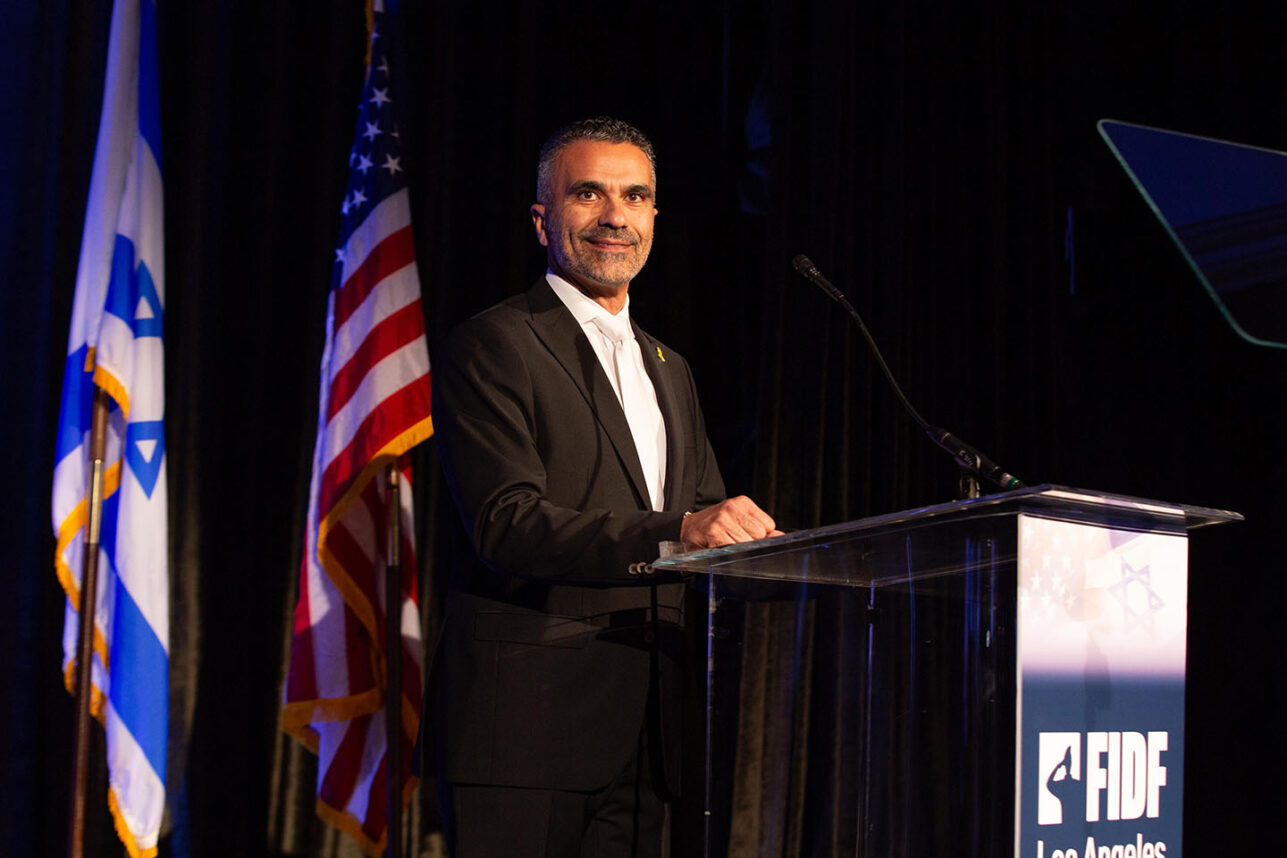
They came to chastise, but stayed to cheer.
An estimated 400 people packed the auditorium atthe Westside Jewish Community Center Tuesday night, prepared to chidethe leaders of the Jewish Community Centers of Los Angeles forseriously considering an Orthodox Jewish high school’s offer to buythe center. They arrived with jaws clenched, speeches in hand; theysigned speaker cards and jammed into the folding chairs andstanding-room only areas. But, unbeknown to them, their battle hadalready been won.
When JCC/LA President David Aaronson announcedfrom the stage that the center had informed the would-be buyer,Shalhevet High School, that “we are no longer interested inconsidering the offer to purchase Westside JCC” and that the center”was never for sale and is not for sale at this time,” there was agasp of surprise, followed by a standing ovation and cries of “bravo!bravo!”

JCC/LA board members decided to no longerconsider the sale after vocal community protest, including a picketline in front of the center during last Sunday’s Purimcarnival.
The phone calls and letters that have delugedAaronson, JCC/LA Executive Vice President Jeffrey Rouss and JewishFederation Executive Vice President John Fishel in recent weeks”clearly creates a mandate to take another look at the Westside JCCand its future in this community,” Aaronson said. He had spoken tomembers of the JCC/LA’s executive committee, which last week voted,6-5, with one abstention, to continue considering Shalhevet’s offer,and they all agreed to withdraw their votes, the board presidentsaid.
Then, late Tuesday afternoon, a letter arrivedfrom Shalhevet’s founder and president, Dr. Jerry Friedman, whostated that, “in the spirit of shalom bayit [peace within the home],we are withdrawing our offer.”
Sadly, Friedman wrote, “we had a perfect fit,”creating “a synergistic relationship with members of the WestsideJewish Community Center, with the seniors, with the nursery schooland with My Jewish Discovery Place [a children’s museum].”
The Modern Orthodox school, which, throughout itssix years of existence, has leased space at the center, has grown to140 students and has been aiming to enroll 180 students next fall.”Our dream was to expand the school so that all who desired a Jewisheducation in a warm, caring community could do so,” Friedmansaid.

In an interview prior to withdrawing his offer,the educator, who is also a real estate developer, said that if thesale didn’t go through, he had no plan to purchase another building.”It would mean big tsoris. It’s not like you can just go across thestreet.”
Temple Beth Am Rabbi Joel Rembaum, who has a sonattending Shalhevet, said in a statement read at the meeting: “Ourcommunity should not be faced with an either-or proposition,” sinceboth the WJCC and Shalhevet were needed in the community. A plan tobuild classrooms and facilities atop the existing Westside JCC a fewyears ago was the sort of compromise that would have provided “awonderful model of a Jewish center and a religiously oriented Jewisheducational institution working together for the sake of thecommunity,” Rembaum said.
WJCC supporters have emphasized from the beginningthat their beef has never been with Shalhevet, and that they hope thehigh school will remain and find another way to expand at the site.It reportedly has raised $8 million, including the $4 million-plus ithad planned to spend to purchase the center.
Basking in the afterglow of unexpected success,speaker after speaker rose Tuesday to describe the importance of thecenter and to thank Aaronson and the JCC/LA executive committee forsaving the 44-year-old Fairfax-area facility.
In the weeks preceding the meeting, the drumbeatfor the opposition — led by an active contingent of Westside JCCboard members — reached a fever pitch, with preschool parents,seniors, ardent devotees of the center’s athletic facilities andother members joining in the grass-roots effort to stop the sale. Onepreschool parent turned her fax machine into a “Save Our Center” hotline.

Above, David Aaronson, president of JCC/LA andMaggie Scott, a WJCC board member, preschool mom and opponent of thesale to Shalhevet demonstrate unity after decision not tosell.
The fight turned bitter when a public meeting twoweeks ago brought no representative of JCC/LA to respond to communityconcerns. A petition against the proposed sale garnered 1,000signatures, and a picket line in front of the center during lastSunday’s Purim carnival attracted cameras from three local TVstations.
Amid the fanfare Tuesday night, there weresobering reminders that the future of the Westside JCC is still farfrom assured. The building on Olympic Boulevard near Fairfax Avenueis in disrepair and badly needs an infusion of cash. Immediaterepairs may require less than $1 million, far below the $4 millionfrequently mentioned as the amount necessary to completely overhaulthe building. Its membership, at about 5,000, is up from previousyears, but still below the 7,000 the WJCC enjoyed in its heyday 20years ago. And there is a need for new programming — particularlyfor the Orthodox, who reside in the area in significant numbers, andfor teens.
Los Angeles City Councilmember Mike Feuer, whoseson attended the WJCC preschool and whose daughter goes there now,warned the audience about leaving the meeting without a game plan forpreserving the center. “This is an exceptional institution in a veryunique and remarkable part of the city,” he said. But deciding not tosell it isn’t enough; expanding membership and raising money is whatis needed. Challenging the audience to “seize the moment,” Feuersaid: “Let’s have another meeting in two months on how to make thiscenter a landmark, not only here but in the whole country.”
The work has already begun, Aaronson said. ThePlanning and Allocations Department of the Jewish Federation isgetting involved, and the Urban Land Institute will do a pro bononeeds assessment for the Westside center, the largest of the six LosAngeles-area JCCs.
Scores of audience members answered Aaronson’scall to join a task force that will raise funds to revitalize andrepair the WJCC. More than $100,000 was pledged on the spot. Thefirst benefactor to step up to the plate was Helene Seifer, pastpresident and current member of the WJCC board, who pledged$10,000.
“Now the work really begins,” she said. “This isjust a reprieve. We have to keep fund-raising and develop the center,or the same thing will happen again.”
Photos by Peter Halmagyi. Photo of Aaronson andScott by Ruth Stroud.
State of Confusion
Many applicants wonder ‘where to turn andwho is in charge’ of the Swiss Fund for Needy Victims
By Tom Tugend, Contributing Editor
Hans Durig, the deputy consul general ofSwitzerland in Los Angeles, is a frustrated man.
Sitting on his desk is a stack of some 220letters, mostly handwritten, from Holocaust survivors. Thepetitioners, most of whom are poor and sickly, are seeking financialhelp from the Swiss Fund for Needy Victims of the Holocaust/Shoa, a$190 million fund set up in February 1997 by donations from leadingSwiss banks and corporations.
“These letters are really heartbreaking,” saysDurig. “They are from old people in desperate need of help, manyalone and in ill health. They have heard of the Swiss fund, but theyare confused where to turn and who is in charge.”
The confusion is understandable. For one, the funddoes not apply to persons with claims against Swiss banks for dormantWorld War II accounts. The fund, says Durig, is a humanitariangesture, and its beneficiaries do not forego any restitution claimsthey may have against Switzerland.
Secondly, it is not the Swiss government that paysout the money and determines the amount going to each applicant. Theaddress for that is the World Jewish Restitution Organization (WJRO),headquartered in Jerusalem.
For applicants in the United States, sixorganizations have been named to process the petitions, all locatedin New York or Washington. They are Agudath Israel WorldOrganization, American Gathering/Federation of Jewish HolocaustSurvivors, American Jewish Joint Distribution Committee, B’nai B’rithInternational, Conference on Jewish Material Claims against Germany,and the World Jewish Congress.
Durig says that he hears constant complaints fromapplicants in California who claim that, after lengthy and expensivetoll calls to the East Coast, they usually can’t get straight answersor find anyone familiar with the subject.
The main reason, says Elan Steinberg, executivedirector of the WJC, is that no system for distributing the Swissmoney has been set up in the United States so far.
“We hope to have a working plan in two to threeweeks,” says Steinberg. WJRO’s first priority has been to get themoney to some 20,000 Jews in Eastern Europe, the double victims ofNazism and communism, to whom $59 million has been allocated.
When distribution commences in the United States,$32 million will be allocated. Steinberg says that there will bewidespread publicity of the fund’s availability, and the onlycriterion will be the applicant’s need. “If you’re needy, you’reeligible,” he says.
Of the remaining money, $24 million is earmarkedfor non-Jewish victims, and the rest will go to Jewish applicants inWestern Europe, Latin America and other parts of the world.
Durig hopes that when the American distributionsystem starts functioning, a processing office will be established inLos Angeles to assist West Coast petitioners.
An Unorthodox
Rabbi
Founder of the Shalom Hartman Instituteand a guest instructor at UCLA, David Hartman teaches ‘freedom withintradition’
By Allan M. Jalon
Rabbi David Hartman, renowned reveler in Jewishcontradictions, is full of them himself. For an Orthodox rabbi, he’sextremely unorthodox; ebullient one minute, he’s melancholy the next.Commandingly articulate about an Israel tortured by divisions, headmits that they can make him feel helpless.

“Jews have traditionally been part of a culture ofdisagreement,” he said during a recent interview in Los Angeles, justafter right-wing religious leaders denied Reform and Conservativerabbis the right to perform conversions. “But you must learn tolisten to someone who disagrees with you with respect.”
At 67, he’s pioneered avenues to such respectbetween secular and religious Jews. “Unique” is how The New YorkTimes’ Thomas Friedman describes Hartman, a leader whose voicedefines what the columnist calls Judaism’s “spiritual peace front.”The founder of Jerusalem’s esteemed Shalom Hartman Institute, aretired Hebrew University philosophy professor and an author ofseveral important books, he’s in Los Angeles to teach Jewish thoughtat UCLA for a semester. He recently challenged 400 people at a UCLAtalk to keep the faith that Israel can stay open to all kinds ofJewish visions.
“American Jewry has to know it’s a new fight,” hesaid. “I don’t want an authoritarian rabbinate or an authoritarianstate, and we should be grateful that they are forcing us to shapeour argument against them.”
There is something Shakespearean about thisround-faced sage with the spray of white hair. In fact, you couldcast him as the expansive friar in “Romeo and Juliet,” that drama ofconflicts turned tragic.
Raised amid the “wonderful Jewish diversity” of aBrooklyn neighborhood, trained at Yeshiva University, he made aliyahin 1971. He is an American-Israeli hybrid who seeks “freedom withintradition,” rejecting the “insulated mind that does not want to opento an alternative point of view.”
He warns gravely about the explosive outcome ifIsrael fails to unify itself. “I won’t say civil war,” he told TheJewish Journal, peering over the storm-framed ocean from the house heand his wife, Bobby, are renting in Manhattan Beach. “But I thinkthere can be fanatical violence between the left and the right.” Hetakes on a worried softness: “There are many people in Israel who areafraid of that.”
His surges toward hope bore traces of despair. Hesaid, almost as an aside: “And, sometimes, Cain kills Abel.Sometimes, there is violence. I have no formula for how to stop it. Ican only say the family is in crisis now.”
The conversion legislation, he said, is”disgusting.” But how does one heal a polarized Israel? First, hesaid, “one must not panic. This is a family, and when the family isin crisis, you are not supposed to panic.”
The best way to protect oneself against absolutistreligious attitudes is “to make sure they don’t have sufficientpolitical power; to make sure that a whole set of basic laws comes toexist that creates a separation between religion and the state,” hesaid.
“I don’t believe you can argue with theright-wing, extreme Orthodoxy. They are not open to human rights.What they want is to impose their will on the community.”
Hartman’s best-known books describe a universewhere Jews can balance, as one admirer put it, “the laws of God andthe will of Man.” He teaches that balance at the Shalom HartmanInstitute.
Students (often teachers as students) are drawnfrom Reform, Conservative and Orthodox backgrounds. Torah trainingmerges with courses on political science, educational theory andother topics. “I am a trained Orthodox rabbi who is trying to rebuilda culture of open interpretation,” said Hartman, who resides inJerusalem with his wife and five children. “Secular Israel is eagerlyanxious for someone to give them access to Jewish history and showhow to apply it to the modern world.”
Recently, the institute trained 30 secular highschool teachers and principals to teach classical Jewish subjects –Talmud, Bible, Philosophy — in their nonreligious institutions. Theinstitute’s modern, four-building campus hosts two Los Angeles rabbisfor two weeks of intensive rabbinical training each year. “They’resuffused with learning they pour back into the community,” said UCLAHillel Director Chaim
Seidler-Feller.
The Times’ Friedman recently devoted a piece toHartman’s views about Israel’s turmoil on the verge of its 50thanniversary. The columnist and the rabbi are close, having met whenFriedman arrived in Israel for The Times in 1984. Hartman decipheredIsrael for him, and he brought Hartman views of the Arab world fromhis travels. Friedman told The Journal that Hartman’s mood aboutIsrael has “come to despair about the political system being able toadapt and develop. But when he talks about the people to be educated,about the school, that is when he becomes optimistic.”
The optimism is making the deepest impressionhere, said Seidler-Feller. “His message that polar divisions do notdefine the religious playing field is very strong,” Seidler-Fellersaid. “The evidence is that we had between 20 and 30 other UCLAfaculty members attending his speech. That is unusual, and it showsthey are forming a connection with the work of healing andunderstanding that he addresses.”
Rabbi David Hartman draws students from allbackgrounds to his courses.
Allan M. Jalon is a free-lance writer who livesin Los Angeles.
Community Briefs
Venerable Volunteers
 Consul General Yoram Ben Ze’ev will honorlocal volunteers who helped gain Israel’s independence.Photo above from “Jerusalem in 3000Years,” 1995.
Consul General Yoram Ben Ze’ev will honorlocal volunteers who helped gain Israel’s independence.Photo above from “Jerusalem in 3000Years,” 1995.
Men and women from Southern California who servedas volunteers in the Israeli Defense Forces during the 1948-49 War ofIndependence will be honored by the Israeli government on Sunday,March 15, at the Skirball Cultural Center.
In inviting some 120 Southland members of Machal(overseas volunteers), Israel Consul General Yoram Ben Ze’ev said:”The role you played to assist Israel during a crucial hour was atgreat risk to yourself. The State of Israel is grateful to you andwishes to recognize your courageous dedication.”
The event, starting at 7 p.m., will include aproclamation by the State of Israel, the awarding of medals andcertificates, a musical program, and a reception, said Ido Aharoni,consul for public affairs. Leaders of the Jewish and generalcommunities have been invited.
In all, some 1,400 American volunteers, most ofthem World War II veterans, served as soldiers, airmen, sailors andnurses in the fledgling IDF during the War of Independence.— Tom Tugend,Contributing Editor
SWC Goes on Alert

The Wiesenthal Center is stepping up securityin light of a recent threat. Photoillustration by Carvin Knowles
The Simon Wiesenthal Center has increased alreadytight security measures in response to reports that the center isamong targets on the hit list of The New Order, a white supremacistgroup.
At a bail hearing for three arrested members ofthe organi-zation in East St. Louis, Ill., the FBI revealed thatother targets included the Anti-Defamation League’s New Yorkheadquarters; Morris Dees, head of the Southern Poverty Law Center;and an unidentified federal judge.
“We are used to threatening calls and hate mail,which we get on a monthly basis, but we take this latest threat muchmore seriously,” said Rabbi Marvin Hier, dean and founder of theWiesenthal Center.
“The New Order has shown that it is willing toimplement its threats and had actually gone after Mr. Dees,” saidHier.
The Wiesenthal Center routinely screens all itsincoming mail, but in light of the latest threat, “we are stepping upsecurity measures, both electronically and through an increasedphysical presence,” said Hier.
According to the FBI, heavily armed New Ordermembers also planned to rob banks and armored trucks to finance theirplots, as well as contaminate “a large water supply” with cyanide asa diversion while they carried out the bombing of Dees’ office inMontgomery, Ala. — T.T.
Zalis’ Role Expands
Gov. Pete Wilson has announced the appointment ofhis senior policy adviser, Rosalie Zalis, to the post of chief ofprotocol.
In the new position, Zalis will serve as thegovernor’s personal representative to foreign government officials,will plan visits by high foreign dignitaries, and will accompanyWilson on overseas trade missions.
“I will serve as liaison to 170 foreign consulatesin California, including the 70 headquartered in Los Angeles,” Zalistold The Jewish Journal.
The tireless Zalis, one of the best-knownpersonalities in the Jewish community, will continue in her multipleother roles as Wilson’s liaison to the entertainment industry andadviser on women’s issues and Middle East affairs.
She was instrumental in establishing theCalifornia-Israel Exchange to promote mutual trade relations, and sheplayed a prominent role in setting up the agency’s Jerusalemoffice.
“Rosalie’s diplomatic talents and boundless energywill serve the state well as we continue our drive to attract foreigninvestments and maintain our position as the gateway to the PacificRim,” Wilson said. — T.T.
Discussing Jewish Schools
Can Jewish education be affordable? That questiontook center stage last Thursday as part of the Newsmaker Forum Seriesat Sinai Temple. About 40 people, mostly parents and grandparents ofday-school students, turned out to hear prominent Jewish educatorsand bureaucrats: Dr. Bruce Powell, president of Milken Community HighSchool; Dr. Jerry Friedman, president of Shalhevet High School; Dr.Gil Graf, executive director of the Bureau of Jewish Education; andJohn Fishel, executive vice president of the Jewish Federation ofGreater Los Angeles. Robert Eshman, managing editor of The JewishJournal, moderated the event, which ended up less a debate than amutual acknowledgment that there’s simply not enough money to goaround.
There are 37 Jewish day schools in the Los Angelesarea, serving 9,375 students. Annual tuition ranges from $7,500 to$13,500, although some schools grant financial aid to as many as 70percent of their students. The Federation, which, this January, uppedits BJE allotment by $1 million, now spends approximately $138 perday-school student annually. This contrasts with an average of $490per pupil in Jewish communities elsewhere.
Shalhevet’s Friedman prodded the Federation to domore. Kindergarten-through-12th-grade day-school education, he said,is the only clear route to Jewish continuity. With the children ofbaby boomers entering the school system in large numbers, theFederation must appoint a vice president charged with keeping theissue of Jewish education always at the forefront, said Friedman. Heasked that United Jewish Fund pledge cards be modified so that donorscan specify their support for Jewish schools. Despite his personalcommitment to Israel, Friedman suggested that $5 million normallyearmarked for the Jewish state remain in Los Angeles to invest in theeducation of local Jewish children.
Fishel stressed the Federation’s fundamentalsupport of education: Now that the
economy has improved, he predictsthat more money will be routed toward schools. Still, he remindedthose present that demands on the Federation come from alldirections. The elderly and newly arrived immigrants have legitimateneeds of their own. Jewish children should also be served throughfunding for Jewish camps and Israel experiences. The big question,for Fishel, is whether the community as a whole supports day-schooleducation as a top priority. The sparse turnout for this panel wasperhaps one hint that interest in the issue is limited to those itaffects directly.
Powell agreed with Fishel that it was up to thecommunity, not the Federation, to provide long-term solutions. Healso emphasized that looking to the government for tuition voucherswas not the answer. Not only might this imperil the whole concept ofpublic education, but it could also bring unwanted governmentmeddling in the operation of Jewish schools.
So where could the money come from? In the future,Powell trusts that day-school graduates will contribute generouslytoward the institutions that helped shape them into Jewish leaders.For now, the best hope is that wealthy angels will step forward. SaysPowell, “I have absolutely no problem asking rich people formoney.”
Philanthropists have made the difference in othercommunities. In Seattle, a major gift from the Samas Foundation hascut day-school tuition by nearly 50 percent. An anonymous donor hashelped underwrite a day-school campus in Orange County.— Beverly Gray,Education Editor
Lecture Canceled
The March 15 lecture on “Jewish Prague” byProfessor Hillel Kieval of the University of Washington has beencanceled due to an emergency. The UCLA Center for Jewish Studies willreschedule the event for a future date.





















 More news and opinions than at a Shabbat dinner, right in your inbox.
More news and opinions than at a Shabbat dinner, right in your inbox.